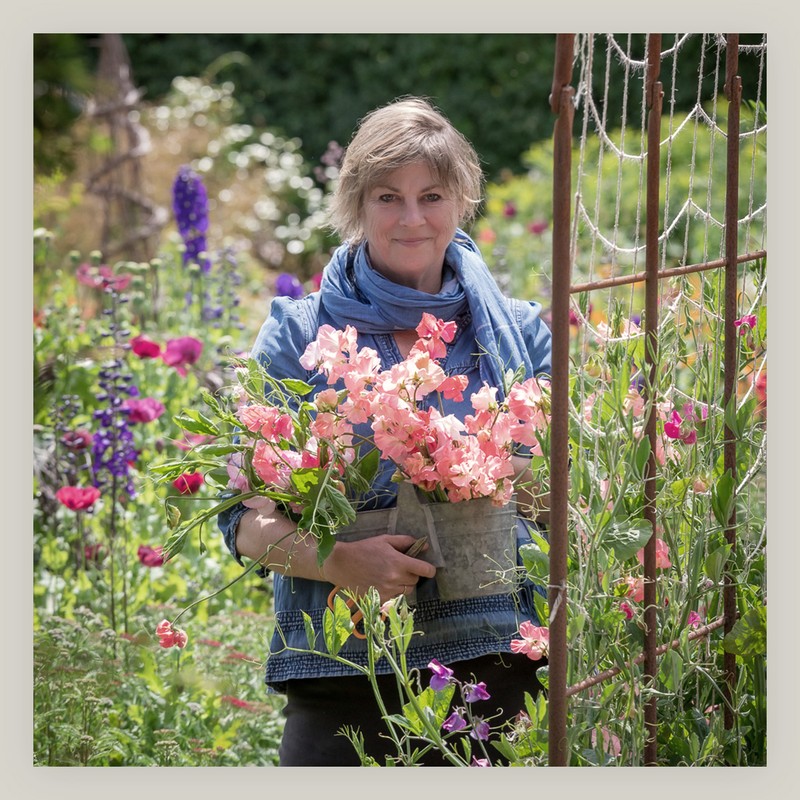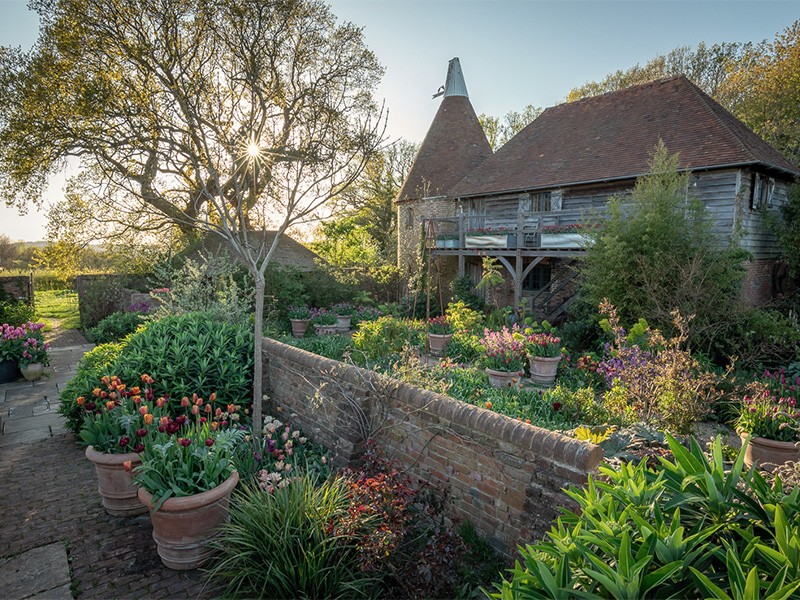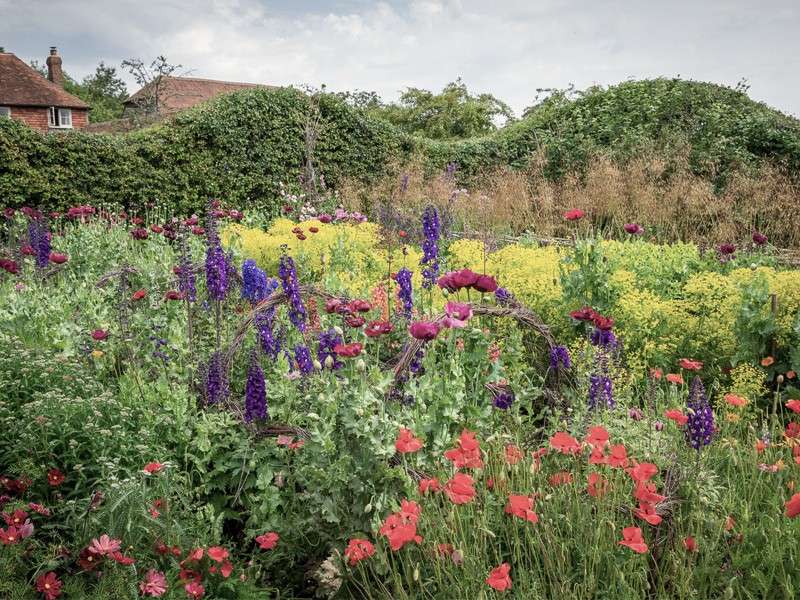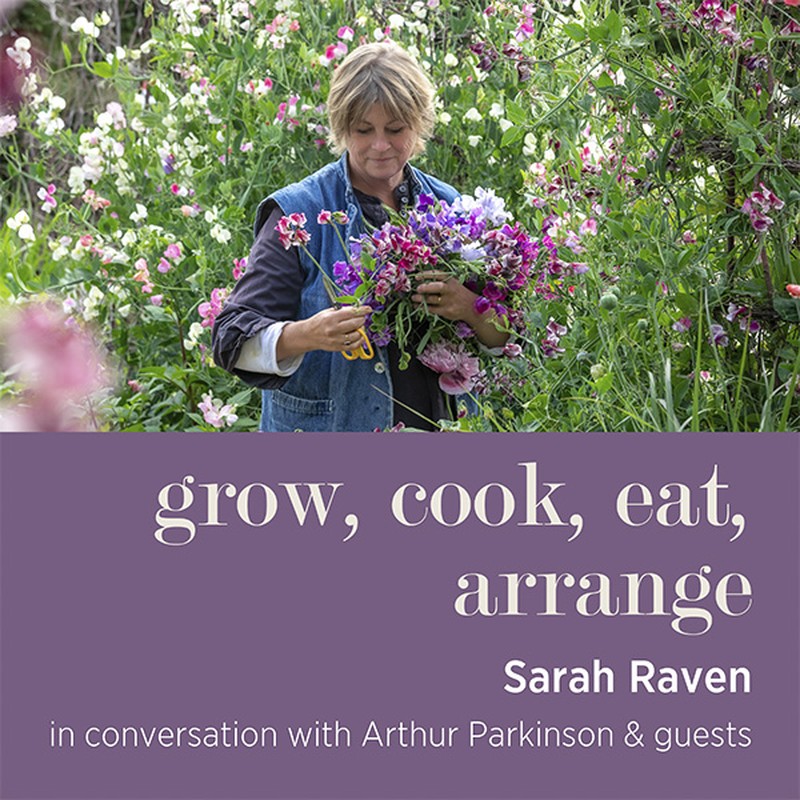
We Talk Life, Business & Gardening With Sarah Raven
You trained as a doctor. What made you give up your career as a medic?
I’m afraid it wouldn’t be something a woman would say now, but the simple answer is because I had children. I graduated with a history degree, then went back to university to study medicine so I didn’t qualify until I was 30. I took a year out to have my first child, but being a junior house doctor with a baby at home wasn’t really manageable and, after having my second baby, I never went back.
After all those years of studying and hard work, do you ever regret giving up medicine?
No, not at all, because I really loved it and it is the most incredible intellectual training and makes you much more analytical.
Why and how did you start your business?
Our first daughter was eight months old and I was still working at the Royal County Hospital in Brighton when we moved from London to Perch Hill. I started growing little metre-square test patches of plants that I’d known as a child – I was brought up in a gardening family and I had botanised with my father since I was six or seven and I knew my plants in a slightly nerdy way. But it was our great friend Monty Don – Adam was at Cambridge with him – who had grown vegetables from seed pretty much all of his life who gave me my first seed-sowing lesson and from there I got addicted to seeds. I had always loved harvesting and cut flowers had been a great thing of mine, so it made sense to start growing flowers from seed.
When I had my second child and gave up being a doctor, I began to grow cut flowers in a more systematic way and really wanted to learn as much as I could, which led to me writing my first book, The Cutting Garden. I also started teaching a bit and people who came to my courses wanted to buy the more unusual seeds I was talking about and that is how my first catalogue was born. It was genuinely a kitchen table business – I love doing menial tasks and was weighing out the seeds, putting them in packs and labelling them. I suppose from there the business grew organically.
How did you get to where you are today with the business?
Sixteen years ago I did a licensing deal with my friend Louise Farman and we divided the business: she’s based in Malborough and runs everything to do with mail order and finance, the meaty stuff; I run everything at Perch Hill – the growing, the photography, the courses. At the start we had a very basic online presence but relaunched the site properly 12 years ago. We’re quite big now and have a nursery in Lincolnshire and a despatch centre in Devon.
How many people do you employ?
We employ a team of 65, mostly managed by Lou. At Perch Hill I have a team of three part-time and three full-time gardeners, headed up by Josie Lewis, and then lots of seasonal workers and interns, of course.

How do you keep innovating and competing with so many other similar businesses?
I’m lucky because I love learning. Covid aside, I spend a lot of time travelling in search of new varieties to trial. I’ve always liked casting my net quite wide and I come back with lots of new interesting plants in unusual colours to be trialled and put together into collections. I believe that is probably one of the keys to our success – we don’t just say 'here’s a plant and here’s another', we suggest plants to put together.
What are the biggest business lessons you've learnt along the way?
To absolutely know one’s weaknesses and not keep recruiting to one’s strengths – if you are a creative person you feel that your idea is the be all and end all, but the creative idea is the nugget and only a very small part of a successful business. I had no business training or business acumen when I started, and I lost a lot and had to borrow quite a bit of money.
What is the one piece of business advice that you were given that will stay with you for ever?
To plan. A creative person tends to have ideas, ideas, ideas, one after the other, and you have to have time to sit and plan and land the ideas before moving on to the next one. Having ideas is not my problem, actually delivering them is. So, either you need to give yourself time or you have to have a good team.
Do you think your medical background has helped?
It has definitively helped with the teaching I do, which brings me on to the second side of the business I run from Perch Hill – the gardening and cookery school. Of course, it’s in a complete hiatus at the moment because of Covid, so I’m lucky I have another string to my bow.
You’ve just launched a podcast. What made you do that?
It’s been something I’ve wanted to do for ages. I used to do a lot of television but I didn’t enjoy it – I don’t like the lookist nature of television; if you’re a relatively well-built middle-aged lady, television doesn’t do you any favours and I found that quite intimidating. But I love teaching which I have not been able to do since last March and so the podcast is a mode of communicating what we’re up to. We are a hotspot of experimentation here at Perch Hill, trying new things, new ways, new varieties, and what is the point if you are not telling people about it? The long form of the podcast is perfect – with my assistant Arthur [Parkinson], who is only 28, we host weekly lively discussions on our favourite flowers to pick and sow and the best edible plants relevant to the season, peppered with advice on floral design as well as cookery.
What has the past year taught you about running your own business?
I’m afraid it’s the cliché you hear everywhere, but it pushed me to make some very difficult decisions which I’d had in the back of my mind for ages but was too busy to take the time to deliver. I’ve decided to stop face-to-face teaching to 30-odd people but instead to open the garden, which is the main thing people want to see. It’s a beautiful and interesting garden, not perfect and grand like Sissinghurst, and some people hate it, but with some it strikes a chord. What we do now – and plan to do again when restrictions are lifted – is to open five or six days a month with timed tickets. It works brilliantly, and pre-pandemic I would never have done that in a million years; I wouldn’t have been so structured. We know pretty reliably when the tulips, the roses, or dahlias and sweet peas are at their best, or when there are dips. Visitors know when to come, they can book lunch if they want, we know exactly how many people are coming – all of which makes it smoother and easier to run, and as a result we’re all having a nicer time and are in a much jollier mood! We hope the first open day will be 14th April.
So you’ve given up teaching?
Well, I might do big venues, but I’m not going to teach here at Perch Hill anymore.
And what has the past year taught you about life in general?
That I need a bolthole from being a team leader all the time. I’d always gone away a lot, I love going to Crete, I love botanising. Then when I couldn’t travel it concentrated the mind and that is why I have just bought a little house in south-east London. I do love being at Perch Hill, but I also need time when I’m not the boss; it’s no longer just home, it’s also where the business is run and I need somewhere I can be with my children, family and friends, and of course the dogs. I do adore everyone here, and they are my other family, but I need time away and it’s made me realise that.
At a time when everyone is struggling to stay motivated, how have you coped and how do you keep your focus?
I find concentration difficult at the moment. I love writing my books and normally find that very easy, but right now there seems to be so much going on with constant Zoom meetings etc, I get much more scattered throughout the week. I’m such an all or nothing person – if I have one task that needs doing then I’ll get on with it, but if I have two or three other things on, I’m perfectly capable of just doing the washing up or changing the sheets. I struggle with that.
Which gardens do you love visiting?
Dutch gardens mostly. If I was to name my favourite, it would be De Boschhoeve in Holland; it has an amazing parterre, mainly ornamental, but it’s incredible. I have a great friend in Holland who is a garden designer and a couple times a year I go with her and look at gardens. Holland in general is a big inspiration for me. I do love Sissinghurst of course – it’s movingly beautiful because of the spaces of the buildings with the gardens. I also go to Great Dixter in Northiam, East Sussex, for the same reason – I find it both restful and exciting at the same time. Sadly no longer, but another real favourite was a place called Chilcombe near Bridport in Dorset – it’s a most beautiful site which was gardened by a painter called John Hubbard who sadly died a few years ago; it was a big influence in the early days.
Which other gardeners inspire you?
I like gardeners who have a sense of place rather than a sense of imposition, gardeners who pick up what’s there and make the best of it. Names would include Troy Scott Smith who sadly has now left Sissinghurst where he was head gardener; Pip Morrison is a total genius in terms of design; and obviously Dan Pearson, though all his projects are very grand. But Pip would be the person I go to every time if I had a project.

Do you have plans to design a garden at Chelsea?
Possibly at some point when I’m less busy with my own business. I just get stretched too thinly between too many different things and then it stops being fun and is just stressful. I’ve done Chelsea twice – once about 20 years ago and again four years ago when I designed one of those feel-good gardens with Radio 2 as a sponsor.
Do you have a favourite plant or flower?
For me, definitely the dahlia – it’s just so versatile, generous and easy, as well as exceptionally easy to grow.
What is the most underrated flower or plant and why?
The chrysanthemum because it flowers so late in the year, but that is just when you want flowers in your garden, when there’s very little out there. There’s been such fantastic breeding and now you get these crazy astra hat varieties that flower in October and November.
What are your best sellers?
Tulips, dahlias and sweetpeas.
What are your top three tips for being a great gardener?
You have to be hard worker: you can’t swan in and then swan out, you have to have some staying power; you have to be a keen learner and use that knowledge; you also need to be creative so that you put things together well, and that gives huge pleasure when it all comes out.
What is the biggest mistake gardeners make?
Not taking enough risk and that is why I love seeds – they don’t cost very much so if it doesn’t work or is hideous it doesn’t really matter. Whereas if you bought a rose and suddenly decide it’s a ghastly colour or doesn’t smell how you want it to, but have spent £15 on it, you’ll be reluctant to chuck it out. You then live with it and end up with a hotchpotch of things you don’t feel strongly about.
Do you have any tips for someone wanting to start growing their own vegetables?
Firstly, you don’t need a big garden, you only need a window box. You can grow salads and herbs in a small city garden, and they really are the things that make a difference to your daily life. The best way is to use a water trough, which are available from farm supply shops – they are about four-foot long and two-foot deep and hold moisture well, so you don’t have to water them every day. Whereas if you plant salads and herbs in terracotta everything evaporates very quickly. As your first crops, I’d suggest sewing some salad, like loose-leaf lettuce, wild rocket and mizuna, and herbs like parsley, chives and rosemary – and you can pick from all these pretty much all year round. It really is easy. Then if you have some more room, potatoes.
You run cookery courses – what do you love to cook?
I have stopped running cookery courses myself at Perch Hill as I don’t want to demo anymore. Instead, I love having guest chefs – it’s fun for them to come to the garden here and harvest away. I love cooking but find day-to-day cooking pretty dull. However, when I’m on holiday I’ll get up really early and go off to the market, and then I feel completely exhilarated. I’m old enough to have quite a repertoire of recipes in my head so will buy whatever is available. If I’m in London, I’ll head to Brockley Market on a Saturday – there’s a very good fishmonger and I’ll buy some seafood, nice bread, some veg and delicious cheese. If I had ten people for supper at this time of year, I’d do a big crab linguine with a wonderful salad.
Who is your favourite TV chef?
Yotam Ottolenghi – maybe rather unoriginally! I went to Palestine and Jordan last year and truly love his kind of food. In fact, Sami Tamimi and Tara Wigley, both from the Ottolenghi empire, are due to come to Perch Hill in May and will cook/demo from their book Falastin.
What is your favourite restaurant?
I really like Brunswick House in Vauxhall – the chef is Jackson Boxer and his parents are great friends of mine so we often meet there. River Café is also the epitome of what I really love – relaxed, delicious food and there’s a low staff-to-customer ratio. Shall I tell you what I really hate? I cannot bear any cook who uses tweezers, that is my definition of the restaurant I don’t want to go to. Adam once took me to a very expensive restaurant in Copenhagen – it was hundreds of pounds – and there were about seven waiters round our table, I just can’t bear that. I was furious and in a terrible mood from the moment we arrived til the moment we left. I hate that over-attentive thing! I also love places like The Delauney and The Wolseley but they do tend to rush you in and out.
You have just turned 58, how do you feel as a woman approaching 60?
I feel fine about it, but the tiresome thing is that you know things aren’t going to get better, they’re just getting worse. And obviously your body doesn’t work as it used to, which is irritating. I love the confidence it gives me, but there’s still so much more to do. I don’t want to get ill and certainly don’t want to die; I want to be here for a lot longer!
How have you found your 50s?
I found the children leaving home and empty-nesting really hard at first. But now that I’ve got used to it, I love it. I also love seeing them as I’m very close to them – I talk to my girls at least every other day.
What advice have you got for other women your age about making the most of life?
Don’t even think about retirement, you need to push yourself.
Are you slowing down at all, speeding up, or staying the same?
I’ve always been a very hard worker, sometimes too much so. There’s certainly no sign of me stopping, but I try not to take my work with me all the time.
Sarah’s new podcast Grow, Cook, Eat, Arrange is available on all major podcast platforms. For more information visit SarahRaven.com
All photography by Jonathan Buckley
DISCLAIMER: We endeavour to always credit the correct original source of every image we use. If you think a credit may be incorrect, please contact us at info@sheerluxe.com.


